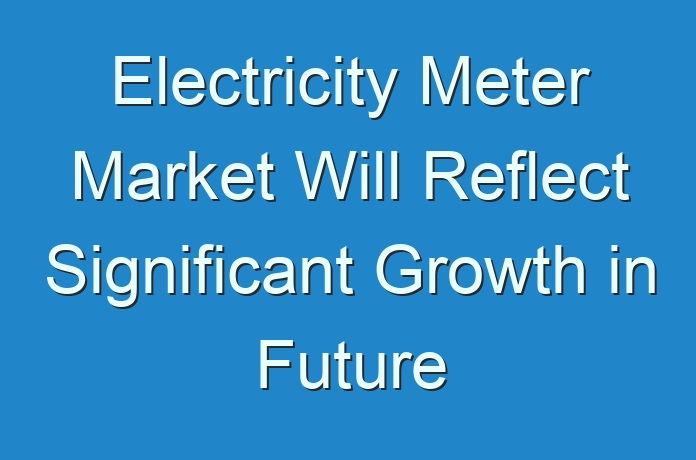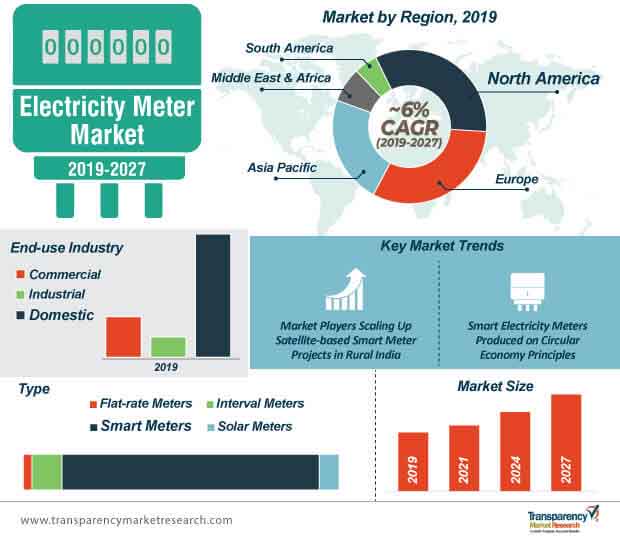
Market Players Step-up with Sustainable and Circular Economy Practices
Along with feature such as improved power quality and detailed information about electricity consumption in electricity meters, manufacturers functioning in the electricity meter market are contributing towards a circular economy. As such, they are adopting sustainable strategies that leverage the internal processes of their companies, supporting the supply chain, and developing partnerships with stakeholders in the value chain.
With increasing concerns about the degrading environmental situation, players of the electricity meter market are developing operational procedures that include a significant reduction in energy and water resources required to produce electricity meters, along with reduction in emissions by incorporating efficient production processes and technologies and improved waste management techniques. These measures help in cost reductions for companies that manufacture smart electricity meters.
Recycling various materials for the production of end-use electricity meters further adds to the cost-efficiency of companies. For example, Iskraemeco – a producer of energy solutions, introduced the ‘Fair Meter’ project that focused on improving labor standards, material scarcity, and e-waste.

To understand how our report can bring difference to your business strategy, Ask for a brochure
Satellite-based Smart Meters Create Profitable Opportunities for Stakeholders
Players operating in the electricity meter market are scaling up satellite-based metered projects in the rural areas of India. Due to the growing demand for energy-efficient electricity meters in India, companies are investing in smart meters with satellite communication technology. These projects are serving as a win-win situation for various stakeholders, including consumers as well as distribution companies.
Smart electricity meters provide improved power quality, reduced outage durations, and flexible payment options. They also provide real-time information about electricity usage via a mobile app, so that consumers can keep a tab on any wastage, and streamline their electricity consumption to save money. These value-added features are gaining the attention of consumers across rural India and driving revenue to the electricity meter market.
Power distribution companies are also increasing their business of smart electricity meters, as these meters ensure accurate billing due to the absence of human intervention. Companies can also remotely discontinue power supply to consumers who do not pay their bills on time. Such innovative business models are generating profitable opportunities in the electricity meter market. For instance, Asian Development Bank – an international development finance institution, announced the launch of the satellite-based smart electricity meters project for households in Varanasi, Uttar Pradesh, with satellite communication technology installed by Energy Efficiency Services Limited (EESL) — the world’s largest energy services company run by the Government of India.
Request a sample to get extensive insights into the Electricity Meter Market
Blockchain and IoT Overcome Limitations of Advanced Metering Infrastructure
The smart electricity meter market is looking at high growth during the forecast period. However, certain limitations are influencing the large-scale deployment of smart metering systems in developing economies. Since some developing economies such as India have a vast geographical spread, manufacturers need to have meter variants as per each unique utility requirement. As smart electricity meters are driven by IT (Information Technology) systems, advanced metering infrastructure (AMI) is prone to malicious attacks. Also, communication technology has a flip side with the applicability and adaptability with AMI, such as.
As such, players functioning in the electricity meter market are investing in novel technologies are that more efficient, cost-effective, and support stability in communication networks. Also, manufacturers are adopting blockchain technology enabled with IoT-based (Internet of Things) deployments to tackle the issue of cyber-attacks on IT infrastructure and AMI.
Stuck in a neck-to-neck competition with other brands? Request a custom report on “Electricity Meter Market”
Read More:
- According to Transparency Market Research’s latest report on the global electricity meter market for the historical period of 2014–2018 and forecast period of 2019–2027, the rising demand for and growing adoption of smart meters is expected to boost the global electricity meter market during the forecast period.
- In terms of revenue, the global electricity meter market is estimated to reach a value of US$ ~8.5 Bn by 2019, expanding at a CAGR of ~6% throughout the forecast period.
Increasing Demand for Advanced Energy Data Monitoring Systems: A Key Driver
- The global electricity meter market is expected to expand significantly during the forecast period, due to growth of the semiconductor assembly & test services (SATS) industry. Smart meters provide real-time consumption feedback to the utility-providing site, and consumers can also monitor real-time data of the power consumed by specific appliances. This consumption data can be monitored using a smartphone.
- Electricity meter manufacturers offer a platform that comprises exclusive hardware and its integrated cloud-based energy-monitoring software. A benefit of these IoT-based monitoring systems is that, they can calculate multiple circuits together, in phase 1/2/3, with the capacity to withstand high voltages of up to 600 VAC and current of up to 6,000 A.
- In terms of calculating the accurate consumption of electricity, advanced and smart electricity meters are more efficient than traditional meters. The energy produced in power plants is consumed by different companies in residential and commercial sectors. Smart meters help these consumers as well as utility providers check, track, and manage power production, supply, and usage. The U.K. Government and the Government of India have approved the deployment of advanced energy management systems, which also include smart electricity meters.
Reduction in Power Consumption with Advanced Smart Meters: A Key Driver
- Smart electricity meters produce substantial volumes of data. They offer an opportunity to utilities to enhance end-customer service, lower cost, and improve energy efficiency. They help consumers reduce energy bills and save energy.
- Advanced metering infrastructure (AMI) is an integrated system of smart meters, communication networks, and data management systems, which enables two-way communication between utilities and customers. The system carries out several important functions that were not possible previously or had to be performed manually. For example, the ability to automatically and remotely measure electricity usage, connect and disconnect service, detect tampering, identification and isolation of outages, and monitoring of voltage and supply in a particular area.
- Due to rapid economic growth led by industrialization and globalization, energy consumption has been gradually increasing over the last few years. The generating capacity of electric power plants cannot fulfill this demand, and, as a result, the consumption of electric energy has become an issue. Smart meters help reduce electricity consumption. By using the data obtained from smart electricity meters, utilities and energy consumption management are able to forecast the demand and manage electricity grids in a better manner.
Inaccurate Electrical Billing: Major Challenge for Electricity Meter Market
- Electricity meters can go wrong any time, just like any other electric device or appliances. This can be a reason for high electricity bills.
- The commercial and residential sectors using energy meters are facing several issues due to the inaccurate billing of power consumption. On the other hand, utility suppliers are also facing difficulties with traditional electric meters in various ways.
- Some factors leading to excess consumption and inaccurate billing may be a malfunctioning appliance such as an air conditioner. Electricity meters with digital displays can issue an error notification or fault message.
- Smart meters are emerging as a solution for these issues associated with traditional electricity meters that may cause inaccurate billing and lead to excess power consumption.
Global Electricity Meter Market: Competition Landscape
- Detailed profiles of the providers of electricity meters have been provided in the report to evaluate their financials, key product offerings, recent developments, and strategies.
- Key players operating in the global electricity meter market include
- ABB Group
- Eaton
- Honeywell International Inc.
- GE Energy Company
- Itron Inc.
- Legrand
- Siemens
- Socomec
- STMicroelectronics
- Wasison Group Holdings.
Global Electricity Meter Market: Key Developments
Key manufacturers operating in the global electricity meter market, such as Honeywell International Inc. and General Electric, have improved their sales structure by raising their capacity for electricity meter production through mergers and acquisitions. Some other key developments in the market are as follows:
- In January 2016, Honeywell announced to have completed the acquisition of the Elster division of Melrose Industries plc, a provider of thermal gas solutions for use in commercial, industrial, and residential heating systems, and gas, water, and electricity meters, including smart meters and software and data analytics solutions.
- In November 2015, Aclara Technologies LLC acquired General Electric’s electricity metering business. This acquisition would strengthen Aclara’s position in the electricity meter market in North America. The market in the region has been expanding at a sluggish pace over the last few years, although it is expected to surge in the next few years due to government regulations.
In the report on the global electricity meter market, we have discussed individual strategies, followed by company profiles of providers of electricity meters. The ‘Competitive Landscape’ section is included in the report to provide readers with a dashboard view and company market share analysis of the key players operating in the global electricity meter market.
Read Our Latest Press Release:
About Us
Transparency Market Research is a next-generation market intelligence provider, offering fact-based solutions to business leaders, consultants, and strategy professionals.
Our reports are single-point solutions for businesses to grow, evolve, and mature. Our real-time data collection methods along with ability to track more than one million high growth niche products are aligned with your aims. The detailed and proprietary statistical models used by our analysts offer insights for making right decision in the shortest span of time. For organizations that require specific but comprehensive information we offer customized solutions through ad-hoc reports. These requests are delivered with the perfect combination of right sense of fact-oriented problem solving methodologies and leveraging existing data repositories.
Contact
Transparency Market Research State Tower,
90 State Street,
Suite 700,
Albany NY – 12207
United States
USA – Canada Toll Free: 866-552-3453
Email: [email protected]





